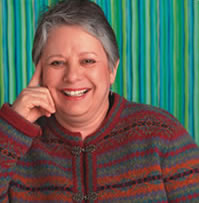Better Care Through Research
Study seeks better ways to care for breast cancer survivors

The University of Michigan Rogel Cancer Center has launched a pilot study to determine whether breast cancer patients benefit from a one-time transition visit at the end of their standard treatment. During the visit, a nurse provides a summary of all cancer treatment the patient received, explains the potential long-term effects of the treatment and offers referrals to other care providers.
The study is one of many planned as part of the Rogel Cancer Center's new survivorship initiative. Other future research initiatives will be based around a $150,000 National Cancer Institute grant to investigate ways to use the Internet to help learn more about the best ways to care for people in this phase of survivorship. The cancer center plans to use this research in the future to develop evidence-based approaches to survivorship care for all cancer populations.
"It's very clear both from our own experience and the published medical literature that patients have issues after the completion of cancer treatment," said Jennifer Griggs, M.D., M.P.H., director of the U-M Breast Cancer Survivorship Program. "Cancer treatment itself is so intense and complicated, but patients are fairly well supported by family, friends and medical professionals during diagnosis and treatment. Then they enter this era we've termed 'survivorship,' and often they find support, including informational support, is lacking."
The new study is enrolling patients who have finished all forms of breast cancer treatment, except hormonal therapy, within the past nine months. The ultimate goal is to determine whether the visit helps patients to manage their own health care.
Olga Muñiz, who was diagnosed with breast cancer in December 2007, said she appreciated the opportunity to have an extended conversation about her concerns. She said she has been having problems with sleeping and is especially interested to know what she should do to prevent recurrence.
"It was very helpful because I did have some questions, even though I do a lot of research on my own and read a lot," said Muñiz, a professor of Spanish and Italian at Hillsdale College. "It's always good to discuss topics with someone else who is more knowledgeable. I was reassured."
Other women have different questions, Griggs said. For example, they may have concerns about fatigue, sexual side effects or changes in the size or shape of their breast. They may be coping with premature menopause, which requires management of symptoms like hot flashes. Or they may need a referral to psychoncology to help work through anxiety, depression or other emotional issues that affect their work or social life.
The transition from active treatment to survivorship can also spark questions about the risk of cancer in other family members.
"Sometimes people need to revisit their original diagnosis. They want to talk about causes of breast cancer. A lot of people need to make sense of what happened to them," Griggs said. "Things happen quickly after a cancer diagnosis, and people jump into treatment. This is the time to reflect upon what they've been through and what this means to their life story."
Continue reading the spring, 2009 issue of Thrive
